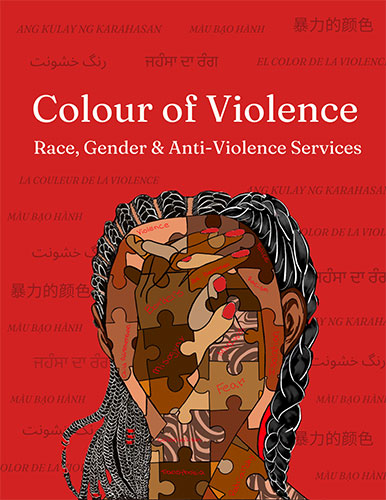Colour of Violence
Race, Gender & Anti-Violence Services
Battered Women’s Support Services is thrilled to announce the launch of Colour of Violence: Race, Gender & Anti-Violence Services, a report placing racialized survivors at the center of anti-violence work.
BWSS engaged in a community-based research project to better understand and raise awareness on the experiences of Indigenous, Black, newcomer immigrant/refugee, and racialized survivors accessing gender-based violence services in British Columbia (B.C).
This work is motivated by the urgency of the many overlapping crises for racialized survivors.
“Understand that racism exists, and survivors experience it.”
Our Colour of Violence: Race, Gender & Anti-Violence Services report explores the extent to which gender and race influence system-based responses to gender-based violence.
Racialized survivors are not only subject to higher probabilities of gender-based violence, but also face structural barriers in accessing safety and support from violence.
“Most GBV services and crisis line volunteers don’t understand amount of violence that Indigenous women face.”
“The services available don’t primarily serve Black, Indigenous or racialized people.”
We conducted surveys with 105 survivors, hosted focus groups with anti-violence workers of colour, and organized a series of public events.
We are deeply grateful to all the participants who brilliantly and courageously shared their time and insights with us.
Through an anti-racist, decolonial, and intersectional feminist lens, we analyze the structural relationship of multiple forms of inequality constituted through and reinforcing one another.
“Stereotypes about who I should be as a woman coming from the Middle East.”
“A lot of GBV services relies on a gender-based binary and heteronormative relationships. There are not a lot of resources for trans and queer people of colour.”
We found that Indigenous, Black, newcomer immigrant/refugee, and racialized survivors in B.C face numerous barriers to accessing safety and support when they experience gender-based violence, such as lack of access to culturally safe services; mistrust of the legal system and other state systems; and being minimized or disbelieved.
“I felt unwelcome, unheard, and unable to connect. I felt like the totality of my experiences were too complex to pull apart and deal with.”
“There are very few Black anti-violence support workers in my city, so it is hard to get culturally relevant support.”
Indigenous, Black, and newcomer immigrant/refugee survivors face particularly heightened barriers to justice, including often being criminalized for reporting violence, having their children apprehended, or facing deportation.
“It felt like being prosecuted all over again; if the police were contacted, your situation was reported to child protection services.”
“We must destroy the myth of the perfect victim, one that has allowed institutions, including the media, education, healthcare, and the courts to maintain that one-size-fits-all model for addressing gender-based violence.”
Our report identifies key barriers in accessing anti-violence services, and also offers concrete best practices for service providers developing anti-violence interventions.
The report and accompanying toolkit are intended to be used as catalysts for positive change to increase access, safety, and justice for Indigenous, Black, newcomer immigrant/refugee, and racialized survivors in this province.

